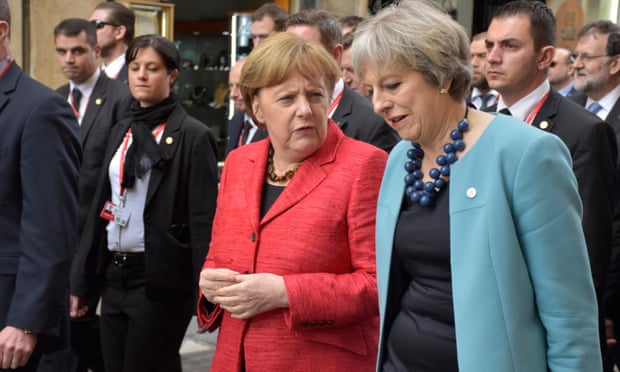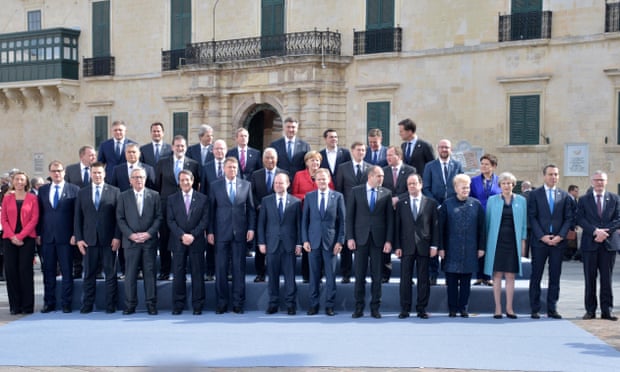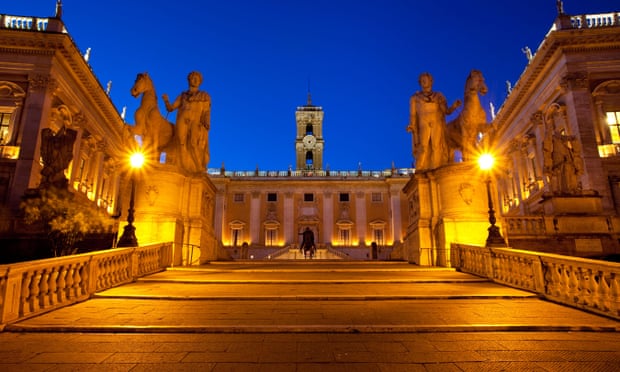British government sees no point in being at event in Rome because UK will not be involved in planning bloc’s future
 Theresa May with Angela Merkel at the EU summit in Malta. The British PM is not expected to attend the Rome summit. Photograph: Xinhua/Barcroft
Theresa May with Angela Merkel at the EU summit in Malta. The British PM is not expected to attend the Rome summit. Photograph: Xinhua/Barcroft
Theresa May is expected to miss the EU’s 60th anniversary summit in March because the British government sees no point in being involved in planning the future of the EU.
The British prime minister was invited to join the celebrations on 25 March with 27 other EU leaders but decided not to take part, a senior EU diplomat told the Guardian. “The door was open, but the response was, ‘We don’t think it is appropriate for us,’” the diplomat said, summarising the UK response.
A second EU source said May’s decision was “entirely logical” because the main focus of the summit would be the future. “We are still a union of 28 and Theresa is of course very welcome to come and celebrate 60 years of the EU in Rome,” the source said. “Rome will be an opportunity to look back at what the EU has done, its achievements … but obviously the main focus is to look to the future.”
 EU leaders gathered together in Malta. Photograph: Xinhua/Barcroft
EU leaders gathered together in Malta. Photograph: Xinhua/Barcroft
EU leaders will gather on the Capitoline Hill in Rome to remember the day when six countries embarked on a project of European unity. The treaty of Rome, signed by France, Germany, Italy, Belgium, the Netherlands and Luxembourg on 25 March 1957, paved the way for the modern EU of 28 countries and 510 million people.
Donald Tusk, who chairs European summits, and Paolo Gentiloni, Italy’s prime minister, want EU leaders to sign a declaration that will chart a path for the next decade. Senior sources say the mood is very different to previous anniversaries, as the EU struggles to contain poisonous splits over migration and the single currency, while managing the fallout of Brexit and an unpredictable president in the White House.
Theresa May faces public backlash over hard Brexit, poll finds
“Rome will be a display of unity,” said the diplomat, adding that it was common sense for the British not to be there. “If you participate you are signing the declaration, which is setting out the vision for the next 10 years. It would make no sense [to be there].”
Sitting out EU gatherings is not a new experience for May, who was not invited to a summit in Bratislava last September, where EU leaders attempted to shore up the EU after the shock Brexit vote.
Attending her first EU summit in October 2016, May complained about fellow leaders taking decisions on EU-wide policies without the UK – the Bratislava summit resulted in a push to strengthen the EU’s external borders and beef up counter-terrorism plans.
But the Rome meeting is not a formal summit and is more likely to result in general declarations rather than detailed policy prescriptions.
The British prime minister has also been warned to tread carefully on the timing of Britain’s EU exit process. May has promised to launch article 50, which formally starts the two-year EU exit process, by the end of March.
In Brussels, expectations are growing that May will hand in the British divorce notice at an EU summit on 9-10 March. The British government has not confirmed that timing, which would depend on the article 50 vote in the House of Lords running smoothly.
A politician from a founding EU member state told the Guardian recently that May should trigger article 50 at least a week before the Rome celebrations, as anything closer would appear “unfriendly”. Italian officials have also told their British counterparts not to spoil the Rome party with an ill-timed article 50 notice.
 Capitoline Hill where leaders will meet to celebrate anniversary. Photograph: Alamy
Capitoline Hill where leaders will meet to celebrate anniversary. Photograph: Alamy
EU diplomats hope to avoid other subjects that would dampen the celebratory mood in Rome. Countries will not be invited to air their differences over a stalled plan to share out refugees. Serious discussions on eurozone integration are also off the table, postponed at least until after German elections in the autumn.
Brussels sources have also played down talk of a bold move to a two-speed Europe, where a central core of countries push forward on deeper integration, leaving peripheral nations in a looser club. The idea, which has been kicking around Brussels for decades, garnered new attention when Angela Merkel offered a cautious endorsement last month. The German chancellor said there would be “a European Union with different speeds [and] not all will participate every time in all steps of integration”.
The EU already has a few basic speed settings: not all countries take part in the single currency, the Schengen open border zone, and different options for defence cooperation exist. Any move to create new “two-speed” structures was not expected from the Rome summit, cautioned the senior diplomat. Such plans were “very complicated” and “cannot be developed in a few weeks and in a year of elections”.
The British government has been approached for comment.
Comments
Post a Comment